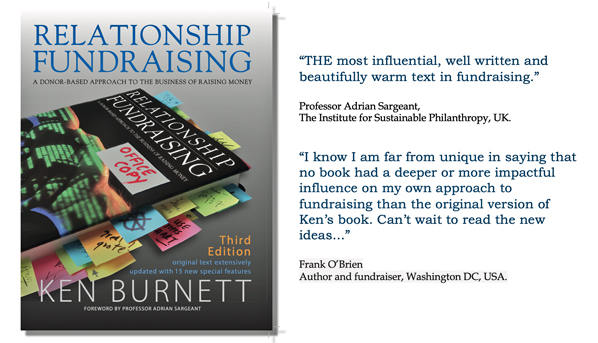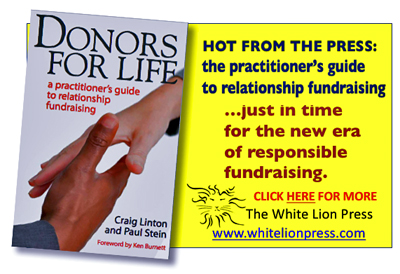| |
|
|
It would seriously gladden any donor’s heart to sit in the audience at almost any fundraising conference just about anywhere these days, listening to the earnest protestations, promises and exhortations of the average fundraiser asserting how ‘donor-focused’ we all are now. ‘Ah,’ the donor would say reassuringly to him or herself, ‘thank goodness. No more impersonal emails and poorly targeted direct mail letters. No more intrusive telephone calls. No more being accosted in the street by clipboard-wielding charity muggers. No more misspelling of my name or getting details of my last gift wrong. Finally, an end to insensitivity and hassle, at last, no more heavy-handed asks and arm-twisting...’
Oh, if only this were so. Sadly it’s just a dream and, for most donors, experience will continue to disappoint. Unfortunately for the donors, the causes that they love (or at least, might like quite a lot) and the long-term future of our profession, there’s some way to go before the relationship rhetoric of our conferences becomes perceived reality, for most of its supposed beneficiaries.
Yet there is quite a lot of new thinking around in the donor relationships field just now, especially in terms of thinking differently, of making it more of a pleasure to be a donor, focussing more on what we want the donor to feel than what we want them to do, on enhancing the donor experience, saying thank you and welcome properly. And, particularly, in the need for fundraisers to get very much better at reassuring donors with, ‘Here’s what we've done with your gift and yes, it did make a real difference.’
And so on.
But is this all just hot air? Mostly, so far, the evidence says it is. Yet I’m still optimistic that we could change this paradigm, and instead show that we can prosper by transforming our donor relationships.
Let’s go back to thinking differently. There’s been a huge hooha in the European media about the draconian attempts of France and Belgium to ban wearing of the veil in their countries. Sections of the Muslim population support the change, others are up in arms. Much distress is caused and tensions have arisen. Several decades ago Kemal Ataturk, the father of modern Turkey, introduced to the Turkish parliament (Turkey is a secular state but with a largely Muslim population) a law designed to achieve the same result but which approached the issue in an entirely different way. Instead of banning the veil he made it compulsory for all prostitutes to wear a veil. Soon the veil became a symbol of a certain kind of woman, so most women quietly stopped wearing it. The desired end was achieved, but by a radically different and less divisive means.
If they would achieve dramatic and transformational results fundraisers too need to think differently. Dramatically differently. But they must focus only on what is practically achievable now. There’s no value in living on a mountain of gold if you can’t use it to get access to the things it can buy.
So taking an optimistic long view, what should be recommended now for the fundraiser who wants to get an advantage over all others, by really enhancing his, or her, donor’s experience? Here are my thoughts.
Seven practical, achievable things I would do differently, if I were head of fundraising now
- Data: I’ll become a master of my data. For to be otherwise would be to demonstrate my foolishness. (Getting there is a huge subject, but to find what you should be doing read Chuck Longfield on SOFII.)
- I’ll make sure that it’s always a pleasure to be a donor. This will be the primary focus of everyone at our place, from CEO and board to the post room and the switchboard. Everyone who gives to us must enjoy being a donor. We’ll make being a donor a secretly selfish act.
- Our donor care team will be the best there is at thanking and welcoming donors of course. We’ll also invest passion, energy and time into comprehensively answering our donors’ most pressing question, ‘Did my gift make a difference?’
- I’ll make a strong, clear case to all donors (and my board) for the need to invest properly in fundraising. Fundraisers make too many false economies because they have failed to adequately present the commercial case for investment in donor development. A hundred dollars invested wisely makes much more sense to donors than 50 dollars wasted. And we'll get a better and safer return from investing our available funds in donor development than we would from any amount of reserves tied up in stocks and shares. I’ll tell everyone this, and show them too.
- I’ll set aside a substantial percentage of my department’s resources as a ring-fenced budget for testing. Say, ten per cent. I’d use this money only for testing new ideas. And I’ll rigorously record and monitor these tests. Then maybe one day I’ll share my learning with other fundraisers, to spread the advantage. Or not. We’ll see.
- My colleagues and I will all take time out from our daily chores to learn how to think differently. Our donors are in for some surprises. Well, it’ll be better than boring them, we think. We’ll read a lot, meet surprising new people and become as learned about our craft and its art and science as we possibly can be. That alone will give us a substantial edge.
- Our communications will focus on making the donor experience unforgettable.
There are of course lots more than just these seven, but it’s best to be realistic. I tire these days of hearing comments such as, ‘What with Twitter, Facebook, LinkedIn and the like I now don’t have time to follow through on all the good ideas that keep coming my way.’ Years from now the people who say such things will still be merely talking the talk.
But you could get ahead, quite easily. Just turn the talk into action.
© Ken Burnett 2010

Visit SOFII to read more from Ken Burnett, including:
What makes an effective trustee board, the 29 essential foundations of fundraising, secrets of headlines that pull, the 11 pillars of fundraising wisdom, a debt to the master, David Ogilvy, the NSPCC Centenary Appeal, what happened to Make Poverty History, the 15 things I would do if I were the new head of donor development... And lots more.
|
|

Turning talk into action is an idea that everyone can rally round.

This article first appeared in the magazine Advancing Philanthropy in November 2010.
At the time of writing Ken Burnett is a director of the Clayton Burnett consultancy firm and The White Lion Press Limited. He is author of several books including Relationship Fundraising and The Zen of Fundraising and is managing trustee of SOFII, The Showcase of Fundraising Innovation and Inspiration. For more on Ken’s books please click here.


Actually a gold mine. Here, now – the book that will change
your life. And your donors’.
|






